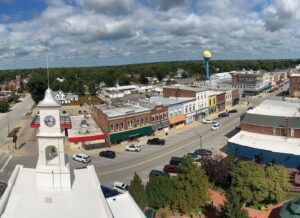
Paxton’s only tax-increment financing district — established in December 2012 — comprises Market Street downtown (above), along with West Ottawa Road to the city’s west edge. Will Brumleve photos/Ford County Chronicle
PAXTON — Thirteen years into its 23-year life span, Paxton’s first tax-increment financing district seems to have achieved, if not exceeded, the level of downtown revitalization originally envisioned by city leaders when it was established in 2012 to spur economic growth both there and along West Ottawa Road around the Interstate 57 interchange.
Newly remodeled storefronts abound in the downtown’s Market Street business district, where funds generated from the TIF district have been used to help property owners replace their windows, doors, awnings and siding, among other projects, to complement a recently enhanced streetscape with new concrete sidewalks, new street light poles and a new asphalt-surface road.
“We’ve got other towns calling us, asking: ‘How did you do that? How did you get your downtown looking the way it is? Would you mind coming and talking to us?’” Mayor Bill Ingold said during the annual meeting of the TIF district’s joint review board on Tuesday, Nov. 18, at City Hall. “So, I think that we’ve done a very good job of doing this. I think without the TIF being there and being able to support and work with these business owners that a lot of this wouldn’t get done. … I’m very proud of what we’re doing.”
The meeting, required by the state’s Tax Increment Allocation Redevelopment Act, included a review of the TIF district’s annual report for fiscal year 2024 — which began May 1, 2023, and ended April 30, 2024 — but no report for the recently concluded fiscal year 2025. Ingold said City Attorney Tony Schuering, who is tasked with drafting the reports, had been waiting on auditors in order to complete the one for 2025, but he did not know yet when a meeting to review it would be scheduled.
While the 2024 report showed signs of progress, especially with the number of projects completed downtown, it also showed plenty of room for growth in the TIF district, especially along Ottawa Road around the I-57 interchange on the city’s west side. The kind of growth once expected there — including a large residential subdivision to be built on farmland southwest of the I-57 interchange — may not happen as part of this TIF district, though, unless it is extended beyond its 2035 expiration date.

Jon Kilgore, interim superintendent of the Paxton-Buckley-Loda school district, speaks Tuesday, Nov. 18, at Paxton City Hall. Will Brumleve/Ford County Chronicle
“The developer’s talking about maybe a TIF 2,” Ingold said, referring to the potential establishment of a second TIF district that would comprise only the farmland in question, “just because this TIF will expire in 10 years and the developer is looking for something longer-term than that with more dollars.”
As a result of the lack of residential development on that farmland so far, the TIF district’s special tax allocation fund has generated far fewer dollars from property improvements than originally anticipated. The expectation of City Attorney Tony Schuering is that the trend will continue, regardless of whether a large residential development finally gets under way. The TIF district’s original budget of $73.8 million, after all, was made under the assumption that hundreds of homes would be built — and at a much faster pace.
“We’re now 13 years in, and there’s not any solidified plan in place (to develop a large subdivision),” Schuering said. “That’s not to say there still couldn’t be development out there, but I think that (the original budget) is unlikely to be met at our current pace within this TIF assuming there is no largescale development that occurs on those parcels.”
As of the end of the 2024 fiscal year, the special tax allocation fund had brought in $906,203 in revenue since 2012, including $901,728 in property tax increment and $4,475 in interest collected, compared with $1.3 million in payments committed to property owners via redevelopment agreements.
“As of today, that ($1.3 million) number’s gone down a little bit,” Schuering noted, “because there have been some agreements that have been paid off in the interim.”
An additional $160,976 was designated in payments via redevelopment agreements for the 2025 fiscal year, Schuering said.
“That’s if we did no other agreements and just paid out our agreements as we’re required to do,” Schuering said.
Schuering noted that the $160,976 figure was below the TIF district’s income for the previous fiscal year of $212,292 — a number that was expected to only grow.
“I think it’s a good position to be in,” Schuering said, “because … that’s below our revenue number for the TIF, so it’s something that is sustainable and we do have a little bit of room for growth in there. … Ultimately, that’s a pretty healthy point to be at right now considering what development has taken place.”
The special tax allocation fund began the 2024 fiscal year with a $126,358 balance and ended the fiscal year with a $118,801 balance — a difference of $7,557 — after collecting $212,292 in revenues compared with $219,849 in expenditures and disbursements.
“This has been a particularly busy year for the TIF — as the last couple years have been,” Schuering said.
Expenditures for fiscal year 2024 included $151,024 in redevelopment costs reimbursed to property owners in the downtown area; $49,029 in other redevelopment costs, most being owed to Cobblestone Hotel & Suites; $18,007 for professional services, most being paid to Schuering’s firm for drafting redevelopment agreements; $1,384 in property tax reimbursements owed to landowners who agreed to have their properties annexed into the city when the TIF district was created; and $406 for recording costs for redevelopment agreements.
Among those paid more than $10,000 out of the TIF district’s special tax allocation fund in fiscal year 2024 were Schuering’s Springfield based law firm of Brown, Hay & Stephens LLP ($17,026 for professional services) and Paxton Hotel Group LLC ($39,029), Victor Torres Jr. ($25,000), Bacon & Van Buskirk ($18,750), Craig and Alaina Kief ($16,636), John Stevens ($14,000), Lenington Realty ($11,808), The Cadillac LLC ($10,000) and Paxton Wash Barn LLC ($10,000), all for “private redevelopment activity,” the report said.
“The biggest number on there was to the Cobblestone Hotel in relation to their redevelopment agreement,” Schuering said, “and then there are some others on there who, pursuant to their redevelopment agreements, received a fair amount of money, as well. … We’ve paid out a total of $195,144 (to Paxton Hotel Group), and we anticipate spending the same $39,029 that we’ve spent every year to reimburse them (again next year). We have a total balance on that redevelopment agreement of $504,856 to go for a total of 700,000.”
According to Mayor Bill Ingold, 32 projects have been completed so far in the TIF district via redevelopment agreements, including 29 on commercial properties and three on residential properties.
“Currently, we have 13 in progress right now today,” Ingold said.
The joint review board is comprised of representatives of each taxing district that overlaps the TIF district, plus one public member. Present for the afternoon meeting were Mayor Bill Ingold on behalf of the city, Superintendent Jon Kilgore on behalf of the Paxton-Buckley Loda school district and former Alderman Bill Wylie as a public representative.


